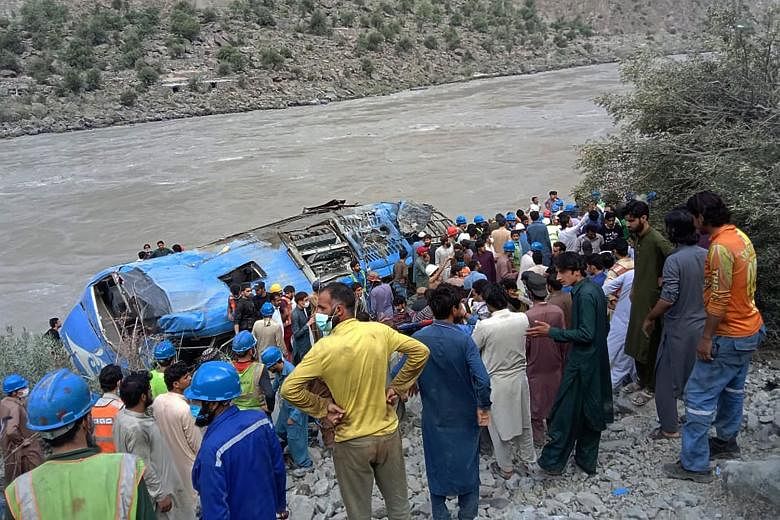ISLAMABAD (REUTERS, BLOOMBERG) - Pakistan said on Thursday (July 15) traces of explosives had been detected during an initial investigation into a bus blast that killed 13 people, including nine Chinese workers, and that a terrorist attack could not be ruled out as the cause of the incident.
Wednesday's blast in northwest Pakistan sent the bus hurtling over a ravine. Beijing initially said it was a bomb attack but later backed away from the assertion and said it would send a team to help investigate the blast, with casualties including nine Chinese workers.
Pakistan originally blamed a mechanical failure, but on Thursday Information Minister Fawad Chaudhry tweeted: "Initial investigations... have now confirmed traces of explosives.
Terrorism cannot be ruled out."
Mr Zhao Lijian, a Chinese foreign ministry spokesman, told a regular briefing that China would cooperate closely with Pakistan in the investigation.
The bus was carrying 32 people to a dam and hydro-electric project in Dasu, near the border with China, Mr Fazal-e-Rabi, an assistant to the deputy commissioner of Kohistan, said over the phone. Two security officials were among the dead, he said, without giving details of the blast.
The bus plunged into a ravine after a "mechanical failure resulting in leakage of gas that caused a blast", said Pakistan's Ministry of Foreign Affairs in a statement on Wednesday.
"Further investigations are underway. Pakistan attaches great importance to safety and security of Chinese nationals, projects and institutions in Pakistan."
China is a close ally and major investor in neighbouring Pakistan, and various anti-Pakistani government militants have in the past attacked Chinese projects.
The Chinese workers killed on the bus were employed at the Dasu hydroelectric project, part of the China-Pakistan Economic Corridor (CPEC), a US$65 billion (S$88 billion) investment plan aiming to link western China to the southern Pakistani port of Gwadar.
CPEC is part of Beijing's massive Belt and Road Initiative.
Mr Chaudhry said Pakistani Prime Minister Imran Khan was personally supervising all developments in the matter.
"In this regard government is in close coordination with Chinese embassy, we are committed to fight menace of terrorism together," Chaudhry added in his tweet.
On Wednesday, Mr Zhao had called the blast a "bomb attack" but Pakistan said a mechanical failure caused a gas leak that led to the explosion.
Senior Chinese diplomat Wang Yi met Pakistani Foreign Minister Shah Mahmood Qureshi and urged Pakistan to investigate the blast but he stopped short of calling it an attack, according to a post on Thursday on the Chinese foreign ministry's website.
But Mr Wang told Mr Qureshi that if it was indeed a "terrorist attack", Pakistan should immediately arrest the culprits and punish them severely.
Mr Wang, who is China's State Councillor and foreign minister, said "lessons should be learned" and both sides should strengthen security measures for China-Pakistan cooperation projects to ensure their safe and smooth operation.
Mr Wang and Mr Qureshi spoke in Dushanbe, the capital of Tajikistan, on the sidelines of a foreign ministers meeting of the Shanghai Cooperation Organisation.
Mr Qureshi said an initial probe indicated the explosion was an accident, not a terrorist attack and pledged to share any outcome with China.
"China is shocked by the serious casualties of Chinese personnel in Pakistan today," Mr Wang was cited as saying in the statement. "If this is a terrorist attack, the perpetrators must be arrested immediately and be severely punished."
"Lessons should be learnt from this incident and security measures for China-Pakistan cooperation projects should be further strengthened to ensure the safe and smooth operation of all projects," according to the statement.
Concerns are mounting over the advance of the Taleban in neighbouring Afghanistan, which threatens to disturb peace across the region.
At particular risk are projects worth US$60 billion (S$81 billion) in the China-Pakistan Economic Corridor, or CPEC, a crucial part of Chinese President Xi Jinping's wider Belt and Road Initiative.
An editorial in the Chinese Communist Party-backed Global Times on Wednesday said the explosion was "clearly an act of terrorism that is both carefully planned and supported by information".
Pakistan has recently seen a resurgence in terrorist attacks, complicating Prime Minister Imran Khan's efforts to overcome an economic crisis with Chinese help. If terrorists are responsible, it would be the worst attack in Pakistan's mountainous north since a 2013 shooting by gunmen who killed nine foreign climbers on Nanga Parbat, the second-highest peak in the country.
Pakistan's military has reported 11 such incidents in the north and south-west region since June, killing 22 soldiers.
The South Asian nation is likely to be among the countries most impacted by the United States troops' withdrawal from Afghanistan as the Taleban continues to capture key districts amid a retreat by Afghan soldiers.
The nation has suffered from terrorism for more than a decade after supporting the US following the Sept 11 attacks.

